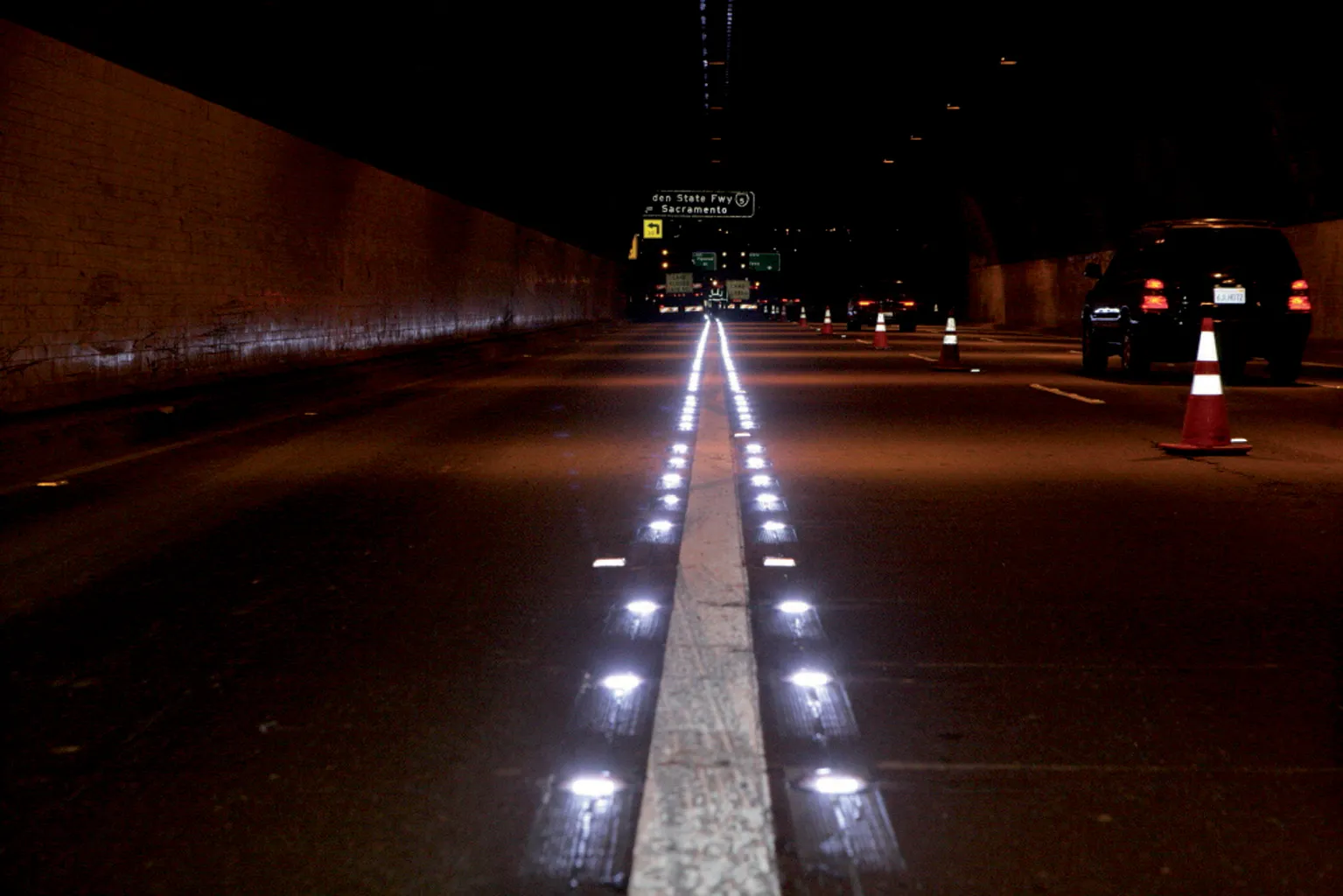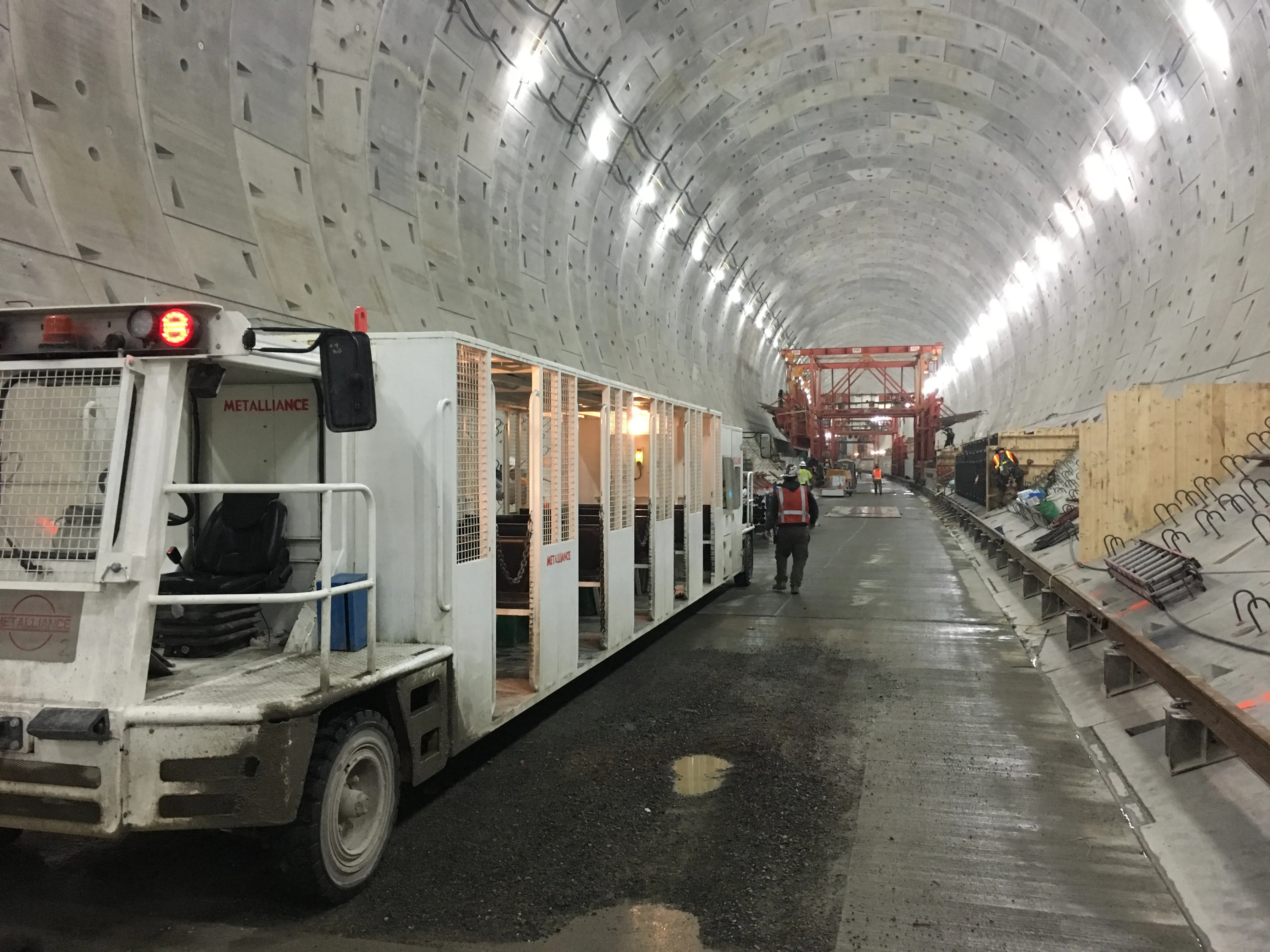In January, a US$3.2 million project saw the California Department of Transportation (Caltrans) in the USA start operating a dynamic lane in Los Angeles. The lane at the northbound Pasadena Freeway (SR-110) connector to the northbound Golden State Freeway (I-5) provides more capacity and provides congestion relief, and is the first of its kind to be introduced in the state. It operates as an optional connector lane during peak hours and a through-lane on SR-110 during general hours, and includes Smartstuds
February 8, 2012
Read time: 3 mins

In January, a US$3.2 million project saw the 2451 California Department of Transportation (Caltrans) in the USA start operating a dynamic lane in Los Angeles.
The lane at the northbound Pasadena Freeway (SR-110) connector to the northbound Golden State Freeway (I-5) provides more capacity and provides congestion relief, and is the first of its kind to be introduced in the state.
It operates as an optional connector lane during peak hours and a through-lane on SR-110 during general hours, and includes Smartstuds embedded in the road.
As well as helping to guide motorists when the number two lane is working as an optional lane to connect to I-5, the studs also transmit data that will help induce the switch from one lane to two, including sending messages to electronic roadway signs to alert motorists of the lane operation.
The studs are produced by New Zealand company151 3i Innovation, which uses inductive power transfer (IPT) to power a range of products including the Smartstud and iiiLevel (eye-level) LED road markers.
The technology, whose potential was originally recognised by researchers at Auckland University, New Zealand in the 1970s, was developed by SmartStud. This brand, with the relevant technology patents and manufacturing expertise, was acquired by 3i Innovation in 2008, and the company then spent two years developing iiilevel, which it claims is the world's first low profile, inductively powered, intelligent road marker.
IPT converts magnetic energy to electrical energy, which allows them to function independently from a fixed-cable system. Energy is delivered by a central cable that emits a magnetic field, but the studs do not need to be fixed by electrical wire to harness the electricity and are thus wireless.
3i claims that key benefits of the technology are that it is waterproof, meaning no corrosion; high energy efficiency; environmentally friendly; high safety rating; easy installations, and fast and easy maintenance.
The low-level, flush-mounted iiilevel stud is made from high-tech polycarbonates and uses energy efficient LEDs as does the Smartstud, which it is claimed is visible in sun, dark, fog or rain up to 2km away. Both products offer patented two-way communication and diagnosis capabilities.3i's studs were also used in Santa Monica's McClure Tunnel in 2003 to illuminate the freeway's centre divider and more recently at Germany's 8km Rennsteig Tunnel, which required 32km of the lights in four lines.
The lane at the northbound Pasadena Freeway (SR-110) connector to the northbound Golden State Freeway (I-5) provides more capacity and provides congestion relief, and is the first of its kind to be introduced in the state.
It operates as an optional connector lane during peak hours and a through-lane on SR-110 during general hours, and includes Smartstuds embedded in the road.
As well as helping to guide motorists when the number two lane is working as an optional lane to connect to I-5, the studs also transmit data that will help induce the switch from one lane to two, including sending messages to electronic roadway signs to alert motorists of the lane operation.
The studs are produced by New Zealand company
The technology, whose potential was originally recognised by researchers at Auckland University, New Zealand in the 1970s, was developed by SmartStud. This brand, with the relevant technology patents and manufacturing expertise, was acquired by 3i Innovation in 2008, and the company then spent two years developing iiilevel, which it claims is the world's first low profile, inductively powered, intelligent road marker.
IPT converts magnetic energy to electrical energy, which allows them to function independently from a fixed-cable system. Energy is delivered by a central cable that emits a magnetic field, but the studs do not need to be fixed by electrical wire to harness the electricity and are thus wireless.
3i claims that key benefits of the technology are that it is waterproof, meaning no corrosion; high energy efficiency; environmentally friendly; high safety rating; easy installations, and fast and easy maintenance.
The low-level, flush-mounted iiilevel stud is made from high-tech polycarbonates and uses energy efficient LEDs as does the Smartstud, which it is claimed is visible in sun, dark, fog or rain up to 2km away. Both products offer patented two-way communication and diagnosis capabilities.3i's studs were also used in Santa Monica's McClure Tunnel in 2003 to illuminate the freeway's centre divider and more recently at Germany's 8km Rennsteig Tunnel, which required 32km of the lights in four lines.







